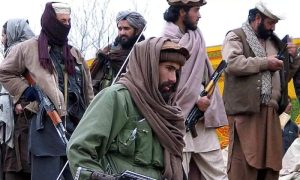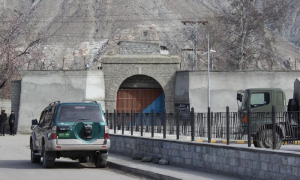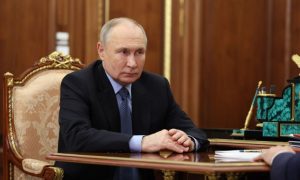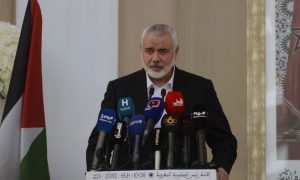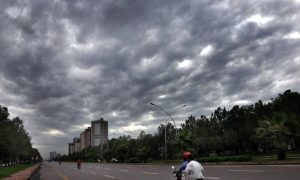The two decades’ longest war on terrorism has come to an end with a peace deal signed by the United States of America and the Afghan Taliban in 2020, leaving behind many questions unanswered.
By striking the deal, there was a hope of having lasting peace in the region, but it remained a hazy mirage. The region is left at the mercy of banned terrorist outfits that could threaten global peace if not checked timely.
An important clause in the deal was highlighted that the world would respect the sovereignty of Afghanistan, and the Taliban would not allow the Afghan soil to be used against any other country. The Taliban, who took control of Afghanistan, has been giving a public posture, claiming to act on the pledges it had made in the peace deal or Doha Peace Agreement.
No country in the world has so far recognized the government of the Taliban or what they call itself as the Islamic Emirate of Afghanistan. Many senior leaders are still on the blacklist with restrictions to move freely abroad, and billions of dollars of Afghan funds have been frozen with no or too slow progress noted.
The United Nations and other International watchdogs have been issuing warnings with the claims that the global and regional terrorist outfits have been reorganizing in Afghanistan since the Taliban captured Kabul. However, the Taliban denies such reports, reaffirming its pledge that Afghan soil would not be used against any country.
Pakistan had played a vital role as a facilitator in ensuring the peace negotiations between the Taliban and the US-led coalition. The role of Pakistan was acknowledged by the US. However, unfortunately, Pakistan, a next-door neighbor and sharing the longest border with Afghanistan, has been facing security challenges from across the Afghan border since the Taliban took over Afghanistan.
In a recent usual press briefing, Pakistan’s Foreign Office spokesperson Mumtaz Zahra Baloch revealed that three Afghan nationals were involved in the July 12 terrorist attack on the FC compound in the Zhob city of Balochistan. “Three slain terrorists involved in the attack were identified as Afghan nationals.” “The terrorists belong to Afghanistan’s Kandahar province,” she noted.
This is for the first time since the Taliban came to power that Pakistan publicly commented on the involvement of Afghans in the terrorist attacks inside Pakistan. Pakistan has strongly reacted to this incident and reminded Kabul to adhere to its pledge, it made in the Doha deal not to allow using its soil.
Pakistan Army Chief General Syed Asim Munir, in a recent meeting with the elders of former tribal regions in Peshawar, has ruled out any talks with the individuals or terrorist groups. “With the unflinching resolve of the nation, Pakistan is successfully countering terrorism to enable a stable and peaceful environment for socioeconomic development in the area,” he said.
General Asim Munir expressed his concerns about having sanctuaries available to the banned outfits and the liberty of action they enjoy on Afghan soil. He criticized the Afghan Taliban for its deviation from the Doha peace deal.
The Taliban has denied the allegations, reassuring that Afghan soil is not being used against other countries, including Pakistan as its next-door neighbor. The Pakistani militants or members of the banned Tehreek-e-Taliban Pakistan fled to Afghanistan almost a decade ago, and now they have been allegedly carrying attacks inside Pakistan.
The Taliban has assured Pakistan to have better cooperation and coordination on the issue, but asked Pakistan to look into the issue internally by securing its country. “Pakistan should manage its security situation carefully and find a solution for it in their territory,” Zabihullah Mujahid, a key spokesman of the Taliban, said in a statement. “In the last one year our forces have killed 18 Pakistani members of Daesh or IS-KP, who were involved in terrorist attacks and blasts in different parts of Afghanistan. Dozens of others have been arrested in different jails in Afghanistan,” Mujahid claimed.
No doubt, whether it is IS-KP or Daesh or the banned TTP, they are posing serious threat to the peace and stability of Afghanistan and Pakistan. Allegations and counter-allegations could not serve the purpose of having peace in the region.
Despite the prevailing volatile environment, some positive voices were raised by the senior leaders of the Taliban, urging the Afghans that going to war across the border is not ‘Jehad’. The Interim defence minister of Afghanistan, Mullah Muhammad Yaqoob, has publicly warned Afghans to avoid crossing the border for attacks. Media reports citing people familiar with the development revealed the top leader of the Taliban, Sheikh Haibatullah Akhunzada, has also issued instructions to the Taliban and Afghan nations to keep themselves away from the militant attacks outside its borders.
What options are left in the prevailing circumstances to avoid the rhetoric that may destabilize the region? Islamabad and Kabul should overcome the trust deficit and move ahead jointly to cope with the rising threat of terrorism.
There is no doubt some individuals on both sides of the Afghan border may be involved in terrorist activities, but there are no more safe havens inside Pakistan for the TTP, Daesh or any other terrorist outfits. Pakistan and the world have been reporting and reminding the Taliban about the presence and regrouping of such terrorist groups that could destabilize regional peace, and Afghanistan may definitely be the worst affected.
Instead of media or public war, the Kabul administration should act on the evidences provided by Pakistan and international organizations about the presence of the militants in Afghanistan. No one can win against the menace of terrorism on its own, but a well-coordinated joint action plan could save the peace and stability of the region.
The interim government of the Taliban in Afghanistan has to go far to be recognized by the world, and it is the only way forward to implement the Doha peace accord. Peaceful co-existence is the option to have socioeconomic development. The international community should not be a silent spectator but play its effective role for peace in the region.














